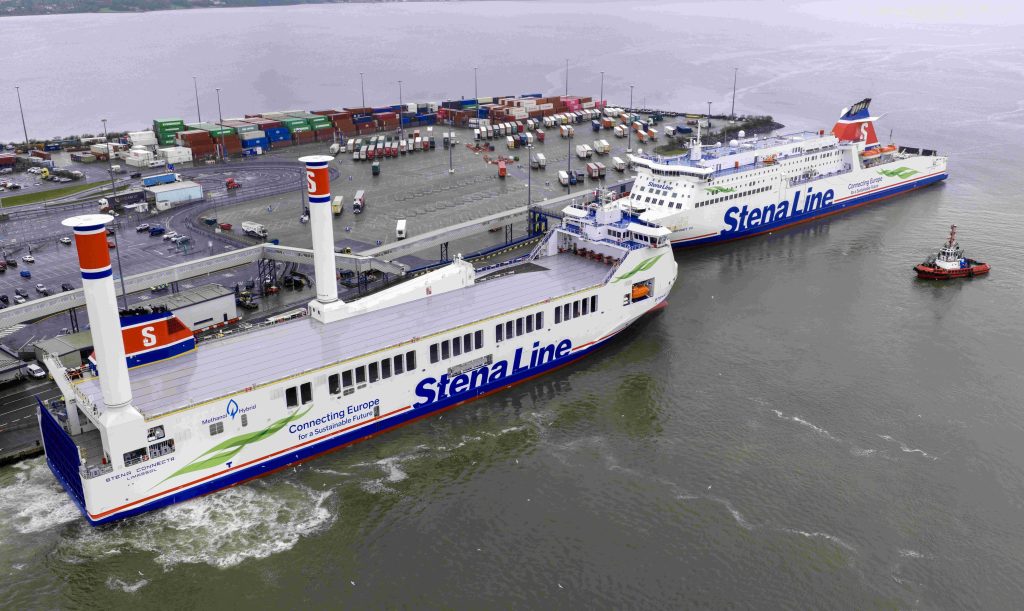New UK Government figures show a developing crisis in trade between Northern Ireland and the rest of the UK as 10.8 per cent of retailers completely stopped sending goods to Northern Ireland in June. Almost three in 10 (29.6 per cent) of transport and storage sector companies say their volumes to the province fell during the month.
Trump’s tariff wars may be grabbing the headlines but Brexit is still impacting trade more than five years on, says the international delivery expert Parcelhero.
Strict new trade rules for goods sent from Great Britain (England, Scotland and Wales) to Northern Ireland, which came in at the end of March this year, have caused retail shipments to tumble.
New Green and Red Channel rules, which are part of the Windsor Framework negotiated by former PM Rishi Sunak, were supposed to simplify exports to Northern Ireland.
However, Parcelhero says 30.8 per cent of retailers shipping to Northern Ireland reported a drop in volumes last month, compared to just 3.5 per cent reporting an increase, according to the latest Office for National Statistics (ONS) Business Insights dataset.
Parcelhero’s Head of Consumer Research, David Jinks, a Member of the Chartered Institute of Logistics and Transport, says: ‘Northern Ireland has a unique trading status as part of the UK but with special access to the EU single market, a result of the Northern Ireland Protocol and subsequent Windsor Framework. In the “sunlit uplands of Brexit” this was supposed to result in goods moving freely between Northern Ireland and both Great Britain and the EU, making it the only region with such dual market access. The reality is that red tape has increased exponentially on goods arriving in Northern Ireland from the rest of the UK.
‘According to the latest ONS Business Insights dataset, 30.8 per cent of GB-based retailers classified as “currently trading” reported a decrease in the volume of products they sent to Northern Ireland in June compared to May, as the latest trading changes continued to bite. Worse still, an alarming 10.8 per cent of GB retailers said they had now stopped sending any goods to Northern Ireland. That’s a significant amount.
‘This decline was reflected in the figures of their transport and storage sector partners, 29.6 per cent of which reported a decrease in the volumes they moved.
‘Nor are these figures likely to be a temporary blip. There has been an ongoing decline in the number of GB-based companies shipping to Northern Ireland over the last year. Just 14.5 per cent of currently trading GB retailers say they have shipped to Northern Ireland over the last year, as opposed to 77.3 per cent who have not. Similarly, only 14.8 per cent of GB manufacturers have sent products to Northern Ireland in the last year, as opposed to 76.7per cent who have not.
‘These figures are particularly concerning when compared to the first time this question was asked, back in January 2021. Even though Brexit had already had a massive impact on trade between Northern Ireland and the rest of the UK, at that time 17.5 per cent of GB-based retailers and 20.1 per cent of manufacturers who responded to the survey were continuing to export to Northern Ireland. Since then, the number of companies sending goods to the province has continued to decline.
‘The latest Windsor Framework regulations introduced at the end of March have done little to help. There is now a Green Channel for goods arriving in NI deemed not at risk of entering the EU and a Red Channel for those that are. Green Channel goods don’t pay any new duties but Red Channel goods must pay full EU Customs fees.
‘That all sounds straightforward but, under the changes, parcel carriers were expected to become UK Internal Market Scheme “trusted traders” to facilitate the new regime, and B2B movement of parcels between NI and GB were expected to align with the processes that were already in place for freight. It’s no wonder that some major couriers announced that they now only provide a B2C/C2C service to Northern Ireland and don’t cover B2B movements.
‘The impact of these changes on transport and storage companies transporting products for their retail and manufacturing partners is clear to see. The ONS survey reported that 94.8 per cent of currently trading transport and storage firms have not moved any goods to Northern Ireland in the last year.
‘Of the small number of transport companies who remain engaged, a superficially encouraging 10 per cent actually reported a rise in volumes in July. However, that was eclipsed by the 43.9 per cent who recorded volumes had stayed the same and the alarming 29.6 per cent who reported a fall in volumes.
‘It could be that the fall in retail B2B exports to Northern Ireland is now impacting High Street sales. According to the latest Northern Ireland Retail Consortium figures, footfall was down -5.2 per cent YOY in June and -3 per cent YOY in July, a reflection, perhaps, of declining consumer choice.
‘Carriers are particularly warning business customers that they cannot move their goods into Northern Ireland if they haven’t uploaded all the correct data to their UK Internal Market Scheme traders’ goods profile.
‘It’s not only Northern Ireland that has seen significant changes in market access and the way in which exports to the country are handled. Post-Brexit, different regulations and charges are also now in place for shipments to the Republic of Ireland.
For more information on shipping to Ireland and for live pricing for courier services to both Northern Ireland and Ireland, see: https://www.parcelhero.com/en-gb/international-courier-services/ireland-parcel-delivery



